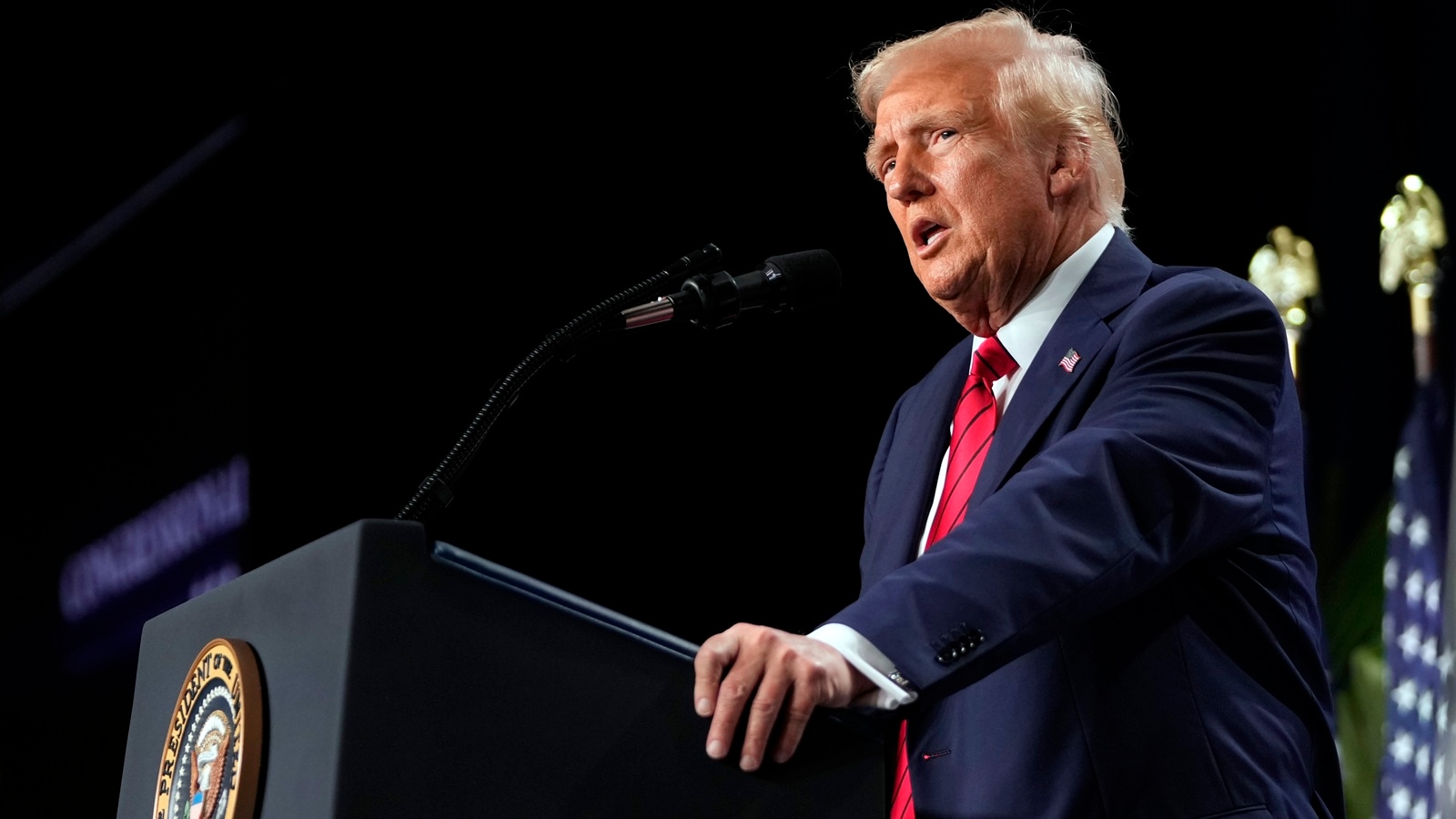Nathan Tankus is the research director of the Modern Money Network. He also writes the Notes on the Crises newsletter.
President Donald Trump’s efforts to freeze federal funds is an unprecedented assault on the federal government — and the beginning of a constitutional crisis. His billionaire donor Elon Musk’s attempts to gain access to the Treasury Department’s payment systems is inconceivably more dangerous.
According to reporting from The Washington Post, CNN, and The New York Times, the Treasury Department’s longtime Fiscal Assistant Secretary David Lebryk has been put on paid administrative leave and plans to resign after refusing to give Musk’s team at the so-called Department of Government Efficiency, or DOGE, access to the operational details of the Treasury’s payment system and the data it processes.
In particular, Musk’s DOGE allies have been asking for what the Times refers to as “source code information” since December and had been rebuffed. Per CNN, Musk’s team was specifically inquiring about the technical ability to stop payments.
Lebryk has been a Treasury employee since 1989 and the Fiscal Assistant Treasury Secretary since 2014, which is the highest position a civil service employee can reach — everyone above him is a political appointee. Trump named Lebryk acting Treasury Secretary while his nominee Scott Bessent went through the confirmation process; as of this writing Lebryk is still listed on the Treasury’s website as the acting Deputy Secretary of the Treasury. His understanding of the operational systems that undergird the functioning of the U.S. Treasury is unparalleled. In particular, he is widely credited as being the person responsible for the undisrupted continuity of cash inflows and outflows at the Treasury during the debt ceiling crises of the past 15 years, while concurrently ensuring the debt ceiling was not breached.
Lebryk was reportedly put on paid administrative leave after he requested and got a meeting with Treasury Secretary Bessent, soon after he was confirmed by the Senate. Bessent’s full willingness to cooperate with DOGE’s desire to access the operational aspects of the Treasury’s payment system, even to the point of overruling Lebryk, is a shocking development. It implies a level of willingness to serve Trump’s interests that has not previously been understood by Congress, Wall Street, or corporate America at-large.
Editor’s picks
However, this is consistent with Trump’s expectations for the role. As I first reported in my newsletter Notes on the Crises, Bessent was advised that what the president wanted in a Treasury Secretary was someone who would have the credibility that Steve Mnuchin, Trump’s first-term secretary, had with Wall Street, but who would be loyal to Trump above all other considerations, according to two sources familiar with the situation. This included, but was not limited to, unconditionally agreeing to work with whomever Trump sent over to the Treasury Department and helping go after Trump’s enemies.
In the context of Bessent’s actions this week, and what Elon Musk and DOGE want from the Treasury’s Bureau of the Fiscal Service, these commitments take on new significance.
The danger is also not in the near future — it is here now. Subsequent reporting from The New York Times indicated Musk’s representatives were granted access to the Treasury payment systems, though the paper wrote that they “have yet to gain operational capabilities and no government payments have been blocked.”
The Times uncritically repeated Musk’s unconvincing rationale for needing access, writing: “Mr. Musk’s initiative is intended to be part of a broader review of the payments system to allow improper payments to be scrutinized and is not an effort to arbitrarily block individual payments, the people familiar with the matter said.”
Related Content
It’s important to understand that “improper” is in the eye of the beholder, and the danger of operational access to the payments system is precisely that there are very little safeguards for its improper use or manipulation. The greatest barrier to such misuse was David Lebryk, and he was shunted aside at the apparent direction of the Trump White House.
The Wall Street Journal separately reported, based on a person familiar with the arrangement, that “DOGE representatives won’t have direct authority to stop individual payments or make other changes,” and will instead have “read only” access. The paper added that “Bessent approved the arrangement on the condition that the DOGE representatives’ activity be documented and monitored.”
However, the point of “read only” access is to make changes through understanding the code. There is no reason to think at this moment that Bessent would resist any of DOGE’s proposed modifications. Until new information emerges, the best sign of what’s going on is Lebryk being forced out.
The internal Treasury payments systems must function correctly; it also matters what purposes it is being designed for — as Musk and his cronies are clearly aiming to redesign the payments system to serve their agenda.
According to the Journal, “Musk and his team think the payment system should be overseen by political appointees selected by President Trump.” This is not the attitude of people who are simply trying to make the payment system more “efficient.” They have a very clear and specific agenda, which involves unilaterally cutting spending, particularly spending they perceive to be going to their ideological foes. Will “Wokeness,” the “Green New Deal,” “Marxism,” and “Gender Ideology” fit Team Trump’s new definition of an “improper payment”?
Musk took to Twitter at 1:52 a.m. on Saturday to claim his DOGE team “discovered, among other things, that payment approval officers at Treasury were instructed always to approve payments, even to known fraudulent or terrorist groups. They literally never denied a payment in their entire career. Not even once.”
It is, of course, not the case that the Treasury Bureau of the Fiscal Service approves payments to “known fraudulent or terrorist groups.”
The Bureau of the Fiscal Service has a “payments integrity unit” which works with agencies to reduce improper payments, and the bureau offered no less than five legislative proposals in its fiscal year 2024 report for improving the payments system and reducing improper payments.
Note that these are legislative proposals, because these require statutory authorization and cannot legally be done unilaterally. They would also cost money to enact, which requires appropriations.
In the 2024 fiscal year the Treasury’s internal payments system processed 1.4 billion payments with an aggregate monetary value of $5.4 trillion. This is 88 percent of the total payments the federal government makes. The Bureau of the Fiscal Service is the pulsating payments heart of the entire federal government.
It makes no sense for this bureau to pick and choose who to pay, just as you don’t screen which apartment buildings are connected to sewer and water lines based on suspicious activity reports about their occupants.
Nor is discretionarily stopping payments at the operational payments level remotely consistent with even the barest minimum standard of due process of law. The job of the Bureau of the Fiscal Service is to serve as a payments intermediary between the rest of the federal government and the wider payments system by routing payments to recipients through the Federal Reserve and onto the banking system.
Without political control of the payments system’s heart, the Trump administration and Elon Musk must chase down every agency and bend it to their will. They are in the process of doing that, but bureaucrats can notionally continue to respect the law and resist their efforts. They are helped in this effort by court injunctions they can point to.
But if Musk and Trump can reach into the choke point, the Bureau of the Fiscal Service, they may not need agency cooperation. They can just impound agency payments themselves. They could also possibly stop paying federal employees they have forced on paid administrative leave, coercing them to resign.
These possibilities are what many Treasury experts instantly thought of the moment they read the first Washington Post report about Musk’s team demanding access to the payments system.
Which brings me to why legislative intervention is needed to modify the data the Bureau of the Fiscal Service collects. The central reason is privacy. The data the Treasury collects could not possibly be more sensitive: We are talking about hundreds of millions of Social Security numbers, as well as a raft of other specific identifying information.
Social Security payments, among many others, flow through the Treasury’s “Secured Payment System.”
The “Automated Standard Application for Payments” (ASAP) specifically allows agencies to send funds to “state and local governments, educational and financial institutions, vendors and contractors, profit and nonprofit entities, and Indian tribal organizations.” This system collects between “10,000 – 99,999” Social Security numbers along with identifying “business” information, including sensitive financial records and “business” bank accounts.
Does anyone think that if Musk could get his hands on this information, whether directly or indirectly, he would not use it to go after, say, nonprofits he dislikes?
At 3:14 a.m. Sunday, Musk pledged to shut down supposedly “illegal payments” to Global Refuge, a faith-based organization that exists to provide “safety and support to refugees, asylum seekers, and immigrants from across the world.” Musk messing with ASAP is no hypothetical at all.
In many ways, the United States functions — to the extent it functions — because agencies keep sensitive confidential information private. If people come to believe that any information they provide the federal government will be a token granting Donald Trump and Elon Musk greater power over them, a multitude of essential functions will fall apart.
All of this is alarming, but potentially the most concerning bit of reporting is that Musk’s team has been asking for “source code information” for the Treasury’s internal payments system — a notion that would make any veteran of legacy mission-critical IT laugh hysterically, and then perhaps weep.
Anyone who knows or has known computer programmers of mission-critical legacy IT systems can tell you about the stories of rafts of consultants who have come and gone attempting to understand how the system works so they can “modernize” it on the cheap. The vast majority of the time, these consultants are either not able to do what they promise or are honest about the cost of updating the system without a mission-critical system “going down,” leading management to balk.
The modernization of the United States Treasury’s legacy IT systems was started almost 20 years ago with Payment Application Modernization and continued with the Post Payment Modernization Initiative, which is still ongoing.
It’s hard to get good information on the exact state of play of the Treasury payments system’s IT modernization. The clearest indication actually comes from a September 2024 press release where the IRS celebrates a great achievement: succeeding to eliminate the coding language Assembly from a component of their IT system. Assembly was a coding language invented in 1947, prior to the ubiquitous outdated mainframe coding language COBOL.
COBOL has proved to be impossible and uneconomic to move away from for the most complex, oldest and most important legacy IT systems. Instead, “modernization” has involved translating “mainframe COBOL” to a more recent and more usable version which can run on modern operating systems called “RM COBOL.” This has been — and remains — an enormous and under-budgeted task.
Does Elon Musk understand any of this? Does he have any grasp of the scale and complexity he is trying to reach into? The most urgent and profound danger is not necessarily what he intends to make this sprawling apparatus do, but rather what he might break in the process of trying to get this apparatus to do what he wants.
Musk has never shown much respect for the concept of a mission-critical IT system.
This is ultimately not that big a deal when it comes to his management of Twitter: Whether the platform goes down for a few hours, degrades over time, or breaks entirely doesn’t matter much. Twitter failing would not be a crisis for the world.
The same cannot be said about the complex and sprawling legacy IT systems and administrative apparatus which make sure that Treasury payments go out, are on time, and never fail.
It’s also important to state that the number of people who comprehensively understand these legacy IT systems can likely be counted on two hands — and that may be optimistic.
The man who understands this IT apparatus the best, David Lebryk, very likely knows things about it that no one else does. Furthermore, it’s possible that he is the only person on earth that fully understands how all the many components of these sprawling legacy IT systems — really a legacy IT “network” — fits together and interacts.
Companies have spent millions of dollars hiring back such people to fix mission-critical IT systems of far, far less importance.
Musk and DOGE’s efforts to take over the Bureau of the Fiscal Service is as dangerous as it gets. It is paramount that career civil service employees be allowed to run the Treasury’s payments system without capricious and self-serving interference from billionaires and their allies.

 2 hours ago
1
2 hours ago
1
















.png)

.png)
.png)
.png)













 English (US) ·
English (US) ·  Hindi (IN) ·
Hindi (IN) ·